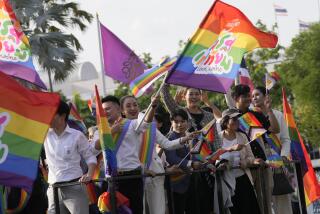CHINA: THE GIANT AWAKENS : THAILAND
- Share via
BANGKOK — Long wary of domination by Communist China, Thailand has always been careful not to provoke its giant neighbor. In 1987 and 1990, it even denied visas to the Dalai Lama, a vocal critic of China’s rule over Tibet.
So when Prime Minister Chuan Leekpai decided last February to allow the Tibetan leader into the country to attend a gathering of Nobel Prize laureates here, it marked a turning point in Sino-Thai relations.
After years of restricted trade and sour relations stemming from China’s support of Thai Communists after World War II, Thailand is now molding a new relationship with Beijing--one that is redefining their diplomatic, business and cultural interactions.
The process is not without its critics in Thailand.
Siding with the Chinese against the Dalai Lama’s visit, for example, was the Thai military, which had cooperated with China to send arms to the Khmer Rouge and other guerrilla factions in their fight against the Vietnamese-backed government in neighboring Cambodia. The Thai military had also on occasion purchased tanks and artillery from China at “friendship prices.”
Thai military leaders may have sided with China in the Dalai Lama affair out of a sense of friendship and loyalty, but this time the once-powerful military failed to have its way. A Bangkok Post editorial described the military support for Beijing as “old-fashioned thinking (which) lingers on without regard for changing times and circumstances.”
Those changing circumstances include the collapse of the Soviet Union and China’s willingness to modernize its economy through capitalist means. As a result, from Thailand’s point of view, the threat of global communism has diminished, justifying a new relationship with China, said Suebsaeng Promboon, a China expert and Vice President of Rangsit University near Bangkok.
Two years ago, China was Thailand’s 16th-largest trading partner. Now it has jumped to 11th, with two-way trade worth $1.3 billion last year, according to Thailand’s Department of Foreign Trade.
“The ties (to China) were there all the time,” Suebsaeng said, noting that even after Thailand and China severed diplomatic relations after World War II, limited Sino-Thai trade continued via Hong Kong. Even Thai-Chinese who had been strongly anti-Communist are now eager to trade with China because they realize that the people of China are “more Chinese than Communist,” he said.
In Bangkok, the Thai-Chinese Chamber of Commerce receives about 400 visiting business groups each year. About 80% are from China, said Chamber President Boonsong Srifuengfung.
Thai companies are equally eager to invest in China, which has vast natural resources and cheaper labor than in Thailand. Bangkok Land, Thailand’s largest property developer, has invested in a $2-billion development in Beijing, and last August, Siam Commercial Industrial Development and its partners launched two shopping mall and office complex projects in China. Bangkok Bank, the largest bank in Thailand, opened its first branch in China last year.
The family trees of millions of Thais are rooted in China--especially Guangdong province in the southeast, where many still have relatives. More than 50% of Thai citizens, including a majority of Thai business leaders, are of Chinese descent, Suebsaeng said. In Bangkok and other cities, the figure is even higher.
Yet the Chinese have not always been welcomed by the Thais. The late King Rama VI, fearing Chinese domination of Thai culture, once disparagingly referred to the Chinese as “Jews of the East,” and Chinese immigration was at one point limited to a mere 200 people a year.
But intermarriage, a common religion in Buddhism, and even Chinese willingness to adopt Thai surnames, have helped to ease cultural friction.
Chinese education in Thailand has also undergone a dramatic transformation. In 1935, fearing the spread of Chinese communism, the Thai government put a ceiling on Chinese education at the fourth-grade level. As a result, many Chinese immigrant families sent their children to Chinese schools in Malaysia, Hong Kong and Taiwan. Today, those students are Thai-Chinese adults fluent in Cantonese or Mandarin, both of which are useful in doing business in China.
Still, tension remains in the Sino-Thai relationship. “We are still afraid of their influence in the future,” said Suebsaeng. “We are not sure of the future of China in terms of the leaders. What will happen in the next decade? At the same time . . . we cannot ignore the Chinese.”
More to Read
Sign up for Essential California
The most important California stories and recommendations in your inbox every morning.
You may occasionally receive promotional content from the Los Angeles Times.










